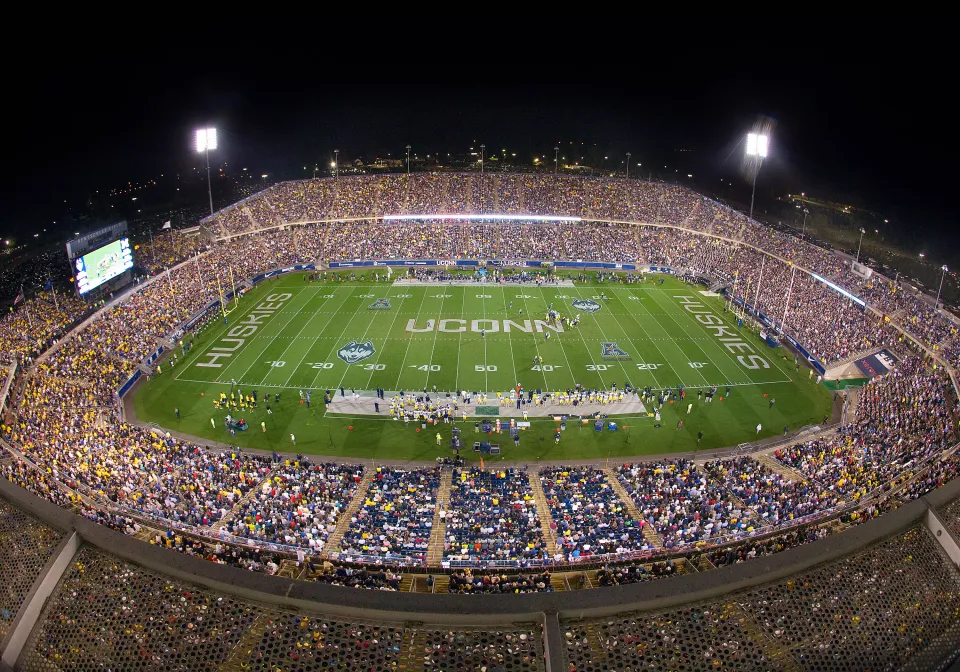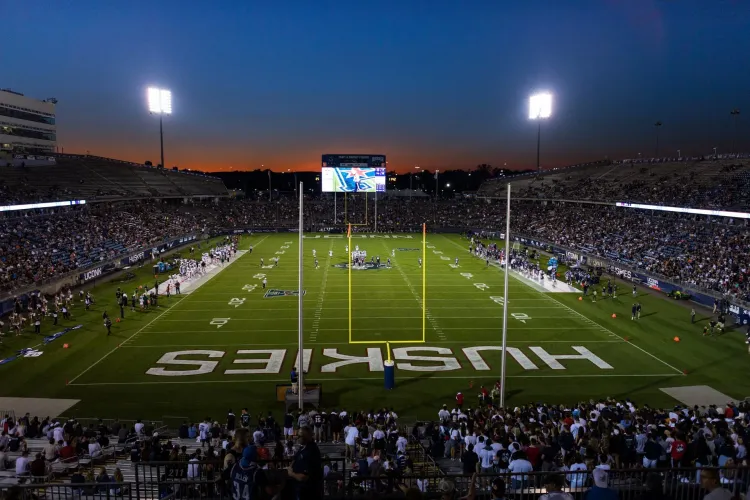A Solution for College Sports

This is the first part of a two-part series on college sports. The second part is here.
In case you haven't been paying attention, the situation in big-time college sports is becoming ever more ridiculous. Universities with big-time football (and to a lesser extent, basketball) programs are tying themselves in knots to maintain a fig leaf of “amateurism” and to preserve their tax-exempt status. NIL (Name, Image, and Likeness) exceptions function as shadow payrolls, which are paid by NIL collectives (bands of rich alumni boosters) that look more or less like venture capital firms. The transfer portal (a mechanism that allows athletes to move from school to school over the course of their career) functions like professional free agency, creating an arms race among coaches for talented players. Arbitrary scholarship caps are set and then easily circumvented. Educational standards are made meaningless by shadow curricula designed (and dumbed down) specifically for football and basketball players. Football and basketball seasons are scheduled according to the logic of TV rather than the academic calendar. Conference realignments defy geography. Like pledges for a fraternity, schools (like mine) that are just outside the big time bend their ethics and stretch their finances in the desperate hope that one of the "Power Four" conferences (The Big 10, SEC, ACC, and Big 12) will let them in. It's a farce, and everyone—fans, students, faculty members, university administrators, and the athletes themselves—knows it.
This isn't just embarrassing. Even according to the NCAA's own statistics (which I would take with a large grain of salt), most big-time athletics programs lose money for their universities, which can't help but harm the educational mission for which they are granted their tax-exempt status. The recent explosion of legal online betting is setting universities up for serious legal troubles. Most worrying, the voting public's trust in higher education is at an all-time low. We tend to blame high tuition prices and "wokeness" for college's bad reputation, but the obvious hypocrisy of college sports is a daily, multi-billion dollar reminder of why people shouldn't trust us. Something has to be done.
The Proposal: The University as Shareholder
If the Power Four want to be the NFL, let's just make them a professional league. If big-time college football and basketball players want (and deserve) to be paid like professional athletes, let’s just make them professional athletes. If the big college sports programs want big-time profits, let’s just make them for-profit companies.
Here is what I propose: The Power Four should simply start a professional league and have each member university spin its team off as a for-profit corporation, with the university being the primary equity shareholder.
The mechanics would be straightforward and transparent:
- The Spinoff: The team becomes a private entity (e.g., "Alabama Football, Inc.").
- The License: The university creates a licensing agreement with this new private entity for the use of its trademarks—its name, logo, mascot, and branding. They could even contract with the university marching band for in-game entertainment.
- The Returns: The private team operates under this licensing agreement and returns profits to the university according to its equity stake.
The teams could be wholly owned subsidiaries of the universities, or, if they wanted to raise more money, they could sell equity stakes to boosters. Imagine the wealthy alum who wants more influence; instead of "donating" to a nebulous NIL collective, they could purchase non-voting shares in the team itself. The league could then set rules, salary caps, and labor standards just like the NFL or NBA, without the pretense of student-athlete regulations that no longer make sense. The new league could even pursue an antitrust exemption from Congress like the ones enjoyed by MLB, the NFL, and the NBA.
The Precedent: Football as "Tech Transfer"
Maybe this sounds far-fetched. But this kind of arrangement wouldn’t be that unusual. In fact, it is standard practice in the research wing of all the Power Four schools.
Universities hold all kinds of equity stakes in private companies that were spun off from university research labs, especially pharmaceutical, biotech, and Internet companies. When a university lab develops a new vaccine or a piece of software that has commercial viability, they don't pretend it's just a student project. They patent it, spin it off, and the university retains equity. It is called "technology transfer" and every major university has an entire office dedicated to it.
Why treat the athletic department differently from the chemistry department? In the context of the Power Four, the football team is essentially a highly successful lab that has produced a commercially viable entertainment product. Spinning the teams off would simplify the finances, obviate the NIL charade, and protect other sports and smaller universities that truly fit the amateur model.
It would also solve a crisis of leadership. University administrators, especially presidents, are trained as academics. They are scholars and educators. They are woefully unprepared and temperamentally unsuited to play the role of, say, Jerry Jones of the Dallas Cowboys or Jeanie Buss of the L.A. Lakers.
We are currently asking people whose main expertise lies in applied physics, or 17th-century French history, or clinical psychology to manage massive entertainment conglomerates. Tech transfer exists because university administrators can't manage the complexities of bringing a new drug to market or running an Internet startup. Why should we expect them to be able to manage a multi-billion dollar sports franchise? It is a mismatch that hurts both the sports product and the university’s academic mission.
Saving the True Amateurs
It also hurts the rest of college sports. The insatiable appetite of the "revenue sports" is starving the rest of the athletic department. As the financial demands of the football arms race escalate, we are seeing a drain on the resources available for the rest of college sports—especially the Olympic sports.
Like it or not, in the United States we have decided to tie participation in sports to the educational system. For the vast majority of kids, playing sports means playing sports at school. Personally, I think that's on balance a good thing as it ideally makes the physical fitness, mental health, and social benefits of athletics as universally available to young people as math and reading. The private system of club sports that predominates in Europe, for instance, is much more exclusionary.
Originally, in the 19th and early-20th centuries, this inclusive system of sports participation extended into higher education. If you played football in high school, it was available to you as an option in college as well. Of course, that hasn't been true of big-time football and basketball for a long time. But until recently, it remained true of the less visible sports, especially the Olympic sports.
Programs like track and field, swimming, and gymnastics still truly operate as amateur competitions, yet they are increasingly sacrificed to feed the beast of the semi-pro leagues operating under the same roof. This is a major loss for the university community. In 2021, UConn erected a monument to honor its student-athletes who had gone on to compete in the Olympics. Yet that same year, UConn eliminated its men's swimming, tennis, and cross country teams citing lack of funds. Good sport-by-sport statistics are hard to come by, but the UConn football team probably operates at a loss of around $10 million per year. Separating the for-profit giants from the athletics department would stop this cannibalization, allowing the university to support genuine student-athletes without the distortion of the profit motive. (Full disclosure: as a former swimmer, this is something close to my heart.)
Ending the Charade
If big-time college football and basketball want to make the kind of money made by professional sports leagues, it would be much simpler and more profitable simply to operate as a professional sports league. It would also make big-time college sports better for the fans. If coaches, athletes, and athletic directors could get out from under all the artificial rules and redirect the energy they spend upholding a charade to producing excellence on the playing field, imagine how much better the game play and more spectacular the entertainment product would be.
The tech transfer approach secures the university's financial interest while severing the toxic link between higher education administration and the cutthroat entertainment business. It allows the players to become real employees, and it allows the university to get back to the business of education, collecting its dividends from the football field just as it does from the patent license. Simple. Straightforward. Honest.
You may be wondering what happens to the schools like UConn outside the Power Four in this scenario. In my next post, I'll explore what a new National College Football League might look like in practice.






Member discussion